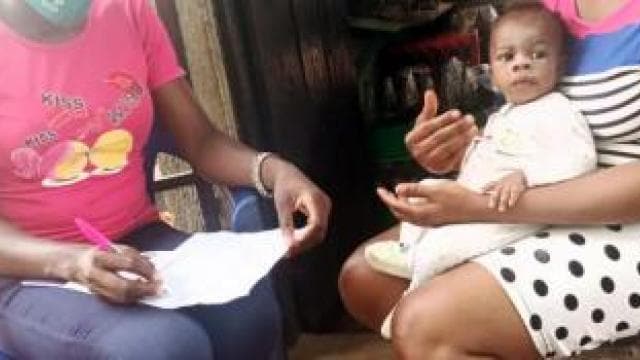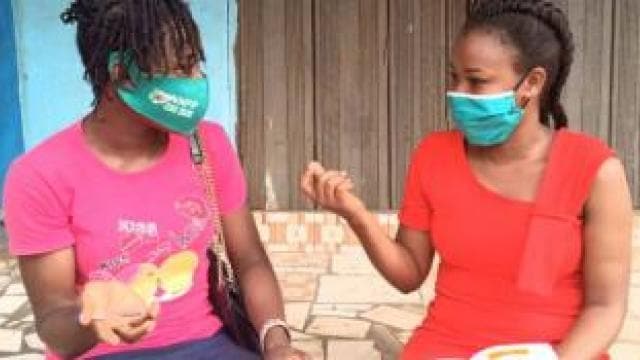- Health at Bayer
-
Pharmaceuticals
- Treatment Areas
- Innovation & Technologies
- Cell and Gene Therapy
-
Sustainability
- Patient Access Charter
- Leadership Perspective
- Strengthening Healthcare Access
- Moving Non-Communicable Diseases Care Forward
- Ensuring a Sustainable Product Supply
- Delivering Better Cancer Care
-
Empowering Women, Globally
- Boosting Family Planning Usage through Digital Channels
- Capacity building: Addressing Root Causes through Partnerships
- Impact at Scale: The Challenge Initiative
- Promoting Awareness: World Contraception Day (WCD) & the Your Life Campaign
- Providing Accessible and Affordable Contraceptives
- Enabling Family Planning in Humanitarian Settings
- Fighting Neglected Tropical Diseases
- Transparency
- News & Stories
- Personal Health
- Report a Side Effect
- Medical Counterfeits
Background
Jessica is one of the recipients of FP services during the Family Planning Competency-based Training (FP-CBT) practicum in Cagayan de Oro City. The FP-CBT is an identified capacity building intervention and part of the city program design.
Gusa is one of the barangays (village) in Cagayan de Oro City. Gusa was identified by the City Leadership Team as a priority site because of the high prevalence of teenage pregnancy in the area. Jessica is one of those walk in clients who walked a few kilometres from her house to the facility to avail FP services.
Tell us something about yourself, your family background, your education, etc.?
I am Jessica E. Larida, seventeen (17) years old, a resident of Zone 4B Barangay Gusa*, the second child of three children. My family used to live in Metro Manila until my mother and father decided to separate. My father took me with him and went home to Cagayan de Oro City where he met my stepmother. My stepmother and I do not get along very well with each other. I would wander with friends as a child just to escape home. Despite that, I finished my elementary education, but I was not able to pursue high school because I needed to work as an assistant to an eatery to help support my family’s needs. I met my partner, Ramel Guenita, twenty-four (24) years old, a year ago. I got pregnant three (3) months after being in a relationship with him. He works as a construction worker and earns roughly $ 9.00 a day.
What did you want to be when you were a child?
I wanted to become a Police Officer. I once dreamed of helping and supporting my parents, especially my father who has not been in a good shape for quite some time. Because of the lack of financial support from my parents, I started working shortly after graduating from elementary.
What is most important for you in life? What is the happiest moment in your life?
Today, my child is the most important person in my life. Being a mother to my child has been the happiest moment in my life. I used to wander a lot before I became a mother, but now my child is my topmost priority. I want to be able to train my child correctly and provide her needs to the best of my ability. I hope that she would not go through the same hardships I encountered my entire life.
Tell us something about your marriage?
My partner and I have been living together for a year now from the moment we found out that we were having a child. His care for our child and me is evident especially in doing the household chores. We live together in a makeshift house where there is no source of water and electricity. To have water, we either pay somebody to fetch it for us because my husband works during the day or we gather water every time it rains. As a minimum wage worker, there are times when my partner’s daily income is not enough to support our family’s growing needs. Somehow, we are still able to get by.
Was your first pregnancy planned?
No, it was not. If I could turn back time, I would have delayed my pregnancy until my mid-twenties. I have no clue how to raise my baby, especially since I do not have much of a support system.
When and from whom did you hear about family planning for the first time? Is family planning a topic discussed at home?
I have heard about Family Planning from relatives and friends, but did not quite understand any of them. Back then, I did not care much about it. Family Planning is not a topic my family discusses on a regular basis. I took the liberty to read my baby book and came across different Family Planning Methods. My attention was drawn on the Subdermal Implant and I decided on my own to have it in the hopes of allowing me and my partner some time to enjoy our child and focus on her needs.
Did you talk to anyone about family planning after getting this information? If yes, with whom and what happened? What did you do and why?
At first, I did not tell anyone about my plan to avail of the Family Planning Method that I chose for myself. Because the law in the Philippines does not allow women below eighteen (18) years old to avail any of the available Family Planning Methods without the legal guardian’s consent, I was about to be sent home to secure one before the procedure. The health care provider who assisted me called my father regarding this matter. After explaining the procedure, my father gave his consent believing it would benefit me more than it can cause harm.
How did your partner react to your decision?
Though I did not tell him that I was going to the Barangay Health Center on that day for my scheduled insertion, he was supportive of my plan to use a Modern Artificial Family Planning Method (Subdermal Implant). I know that he approved of it right away because he told me that I did something good. I took control of the situation. My parents and his parents were supportive of my decision as well.
How important is family planning to you?
Family Planning is very important to me. It would allow us to enjoy quality and quantity time with our child, be able to provide for her growing needs and enable us to pursue our remaining dreams with ease. I want to go back to school so I could be able to provide for my child. We cannot afford to have another baby this time. Realizing how difficult it is to raise a child especially now during the pandemic has motivated me to avail my Family Panning Method of choice. The moment I learned about the scheduled Subdermal Implant insertion, I went straight from the house to the venue even if I had to walk more or less five (5) kilometres under the scourging heat of the sun just to get there on time. By the time I reached the area where transportation was already available, I asked a motorcycle driver to bring me to the Barangay Health Station for a dollar ($ 1.00). The driver agreed even though he had no assurance I would be able to pay him. Until now, I still have not paid the man, but the good thing is I now have protection against untimely pregnancies. That is how important Family Planning is for me.
How many kids do you want?
I want to have three (3) children, five (5) years apart.
Have you noticed any changes in the last two years related to family planning information and service availability?
I noticed that more and more women my age have the necessary knowledge to advocate for themselves not to get pregnant at an early age. Had I been more concerned about this matter the moment I engaged in sexual activities, I would have availed of the services that have been provided in the Health Centers for several years now.
Do you think family planning is important for women and society? If yes, why? How important is FP?
Yes, Family Planning is important for women and the society at large. It enables families, especially women, to plan their desired family size, the gap of their children and ease them off the unnecessary burden brought by untimely pregnancies. If families, being the basic unit of society, were planned, then we would have a better society.
What kind of progress would you like to see in the area of FP?
I hope to one day see Health Care Centers providing more inclusive quality services to people who need it most. I hope that the conservative Filipino families would be open to talk about Family Planning so that more and more women could look after themselves and their families.
What are the challenges faced by young married women in adopting family planning? What message would you like to give to other women?
A lot of the women I know could not avail of the Family Planning Methods because of fear that their husbands and/or partners would not allow them. Men should be educated together with the women in the area of Family Planning. My message to all the women—especially teenage mothers like me—is if they do not wish to use any Family Planning Method, they must postpone their sexual debut until they are ready for the responsibilities [and the consequences] it entails. Those who engage in sexual activities must be wise enough to safeguard themselves by using any of the Family Planning Methods available. To the women who wish to plan their families, they have to visit their healthcare provider of choice and be counselled with their husbands/partners on the available methods for them.
In fact, during my Subdermal Implant insertion, I was able to encourage a twenty-two (22) year old woman who was having second thoughts about it. I was glad to know that the courage that I showed enabled her to go through the process. We both have an insertion that day.
Do you still aspire to achieve your dreams and aspirations?
Yes, I want to be able to break the intergenerational chain of poverty in my family. To do that, I aspire to finish my studies so that I can provide for my family’s growing needs. In the meantime, I will focus on my child and do my best to be the mother I did not quite feel having growing up.













